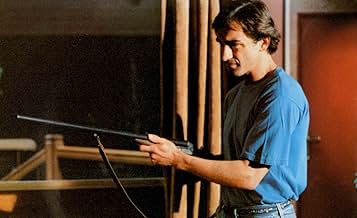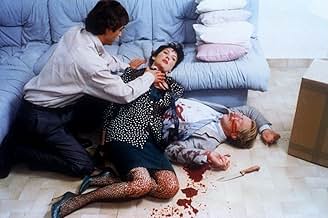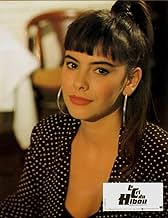IMDb RATING
6.3/10
1.1K
YOUR RATING
After separation from his wife Robert moves to Vichy where he observes beautiful Juliette. Her fiance Patrick becomes jealous and attacks Robert. When Patrick disappears Robert is suspected ... Read allAfter separation from his wife Robert moves to Vichy where he observes beautiful Juliette. Her fiance Patrick becomes jealous and attacks Robert. When Patrick disappears Robert is suspected to have killed him.After separation from his wife Robert moves to Vichy where he observes beautiful Juliette. Her fiance Patrick becomes jealous and attacks Robert. When Patrick disappears Robert is suspected to have killed him.
- Awards
- 1 win & 1 nomination total
Featured reviews
Patricia Highsmith's "cry of the owl" was not her best or even among her best;we are far from triumphs such as "the talented Mister Ripley" "Ripley's game " or "strangers on a train".But it was an interesting psychological study,focusing on a man who thought that, whatever he might do ,he was bound to fall and he would even bring bad luck to his human pals.Like a lot of HIghsmith 's characters ,he was a neurotic,who could not fit in the "normal world" ,with a heavy guilt feeling and a touch of masochism.Chabrol's screenplay is very faithful to the novel,keeping even the last line,but it's a good example of how accuracy leads to failure.
The choice of Christophe Malavoy was excellent because the actor is subtle enough to convey such a despair .But Chabrol put him against a gallery of weirdos who would drive any man insane:a brunette whose behavior is completely implausible,played an unconvincing actress,Mathilda May;a vulgar unattractive wife -Ah Stephane Audran where are you ?- ;a brute of a fiancé who seems even more irrational than the hero,it's the last straw!On the paper the hero's thoughts and frames of mind made up for the implausibilities of the plot and built an atmosphere of ambiguity ,an ambiguity which is almost totally absent in the film,in spite of Malavoy's commendable efforts.To top it all,there's an irritating part of a cop (Kalfon) ,a la Colombo,gobbling up madeleines ,and hinting at Marcel Proust as he tries to remind his unusual suspect of what he may have done.
Because,like in a lot of Chabrol movies,people eat in in "le cri du hibou".The hero and his lady friend treat themselves to some delicious crêpes suzette (flambées) and cassolettes of langoustines:the neurotic is also a gourmet !And he does love the girl's home-made cookies!
Doing two movies a year,Chabrol makes frequently spotty works:such was the case of "le cri du hibou" , deservedly forgotten work,whereas the contemporary "masques " -released at the beginning of the same year- was a brilliant film noir turned almost farce.
The choice of Christophe Malavoy was excellent because the actor is subtle enough to convey such a despair .But Chabrol put him against a gallery of weirdos who would drive any man insane:a brunette whose behavior is completely implausible,played an unconvincing actress,Mathilda May;a vulgar unattractive wife -Ah Stephane Audran where are you ?- ;a brute of a fiancé who seems even more irrational than the hero,it's the last straw!On the paper the hero's thoughts and frames of mind made up for the implausibilities of the plot and built an atmosphere of ambiguity ,an ambiguity which is almost totally absent in the film,in spite of Malavoy's commendable efforts.To top it all,there's an irritating part of a cop (Kalfon) ,a la Colombo,gobbling up madeleines ,and hinting at Marcel Proust as he tries to remind his unusual suspect of what he may have done.
Because,like in a lot of Chabrol movies,people eat in in "le cri du hibou".The hero and his lady friend treat themselves to some delicious crêpes suzette (flambées) and cassolettes of langoustines:the neurotic is also a gourmet !And he does love the girl's home-made cookies!
Doing two movies a year,Chabrol makes frequently spotty works:such was the case of "le cri du hibou" , deservedly forgotten work,whereas the contemporary "masques " -released at the beginning of the same year- was a brilliant film noir turned almost farce.
M. Chabrol has done a strong, creditable job of transferring the powerfully discomforting world of Patricia Highsmith to the screen. Highsmith's characters become moral monsters through a condition of absolute confidence in their own warped psyches. These characters never learn, or understand themselves. Their lies to each other are absolute because they lie to themselves absolutely. No cliché goes unpunished. Characters become moral monsters without losing their sense of rightness. They seem powerless not to act in self-destructive ways.
The film is not equal to "Strangers on a Train" or "Purple Noon," other adaptations of Highsmith's work. But it is faithful in spirit to a novel which is itself not equal to the literary sources of these films. See it with an open mind and revel in the creepiness. Chabrol is a sufficiently great artist to allow another great artist her night cry.
The film is not equal to "Strangers on a Train" or "Purple Noon," other adaptations of Highsmith's work. But it is faithful in spirit to a novel which is itself not equal to the literary sources of these films. See it with an open mind and revel in the creepiness. Chabrol is a sufficiently great artist to allow another great artist her night cry.
This Chabrol movie seems to be almost forgotten - given the few comments printed here and given the fact that it's unlikely to be mentioned among the maestros masterpieces. Even though it is based on a novel by Patricia Highsmith, and has some degree of tension in it, "Le Cri du Hibou" doesn't really draw the viewer inside the small world of it's handful of characters. Everyone in this film seems to have his private neurosis, and when fate bonds them all together, an explosive mixture is the result. Unfortunately (and unusually for Chabrol) the narration is not clever enough to tantalize the viewer. Instead, quite a bunch of implausible elements make it hard to enjoy the unfolding of the story. Then again, since it is the story of a man regarded as threat by his surrounding without ever wanting to threat anyone, a man seen as guilty without guilt (or is there guilt at his hands?), Chabrol had to avoid all too much realism. An ultra-realistic view at the same story would stop at 40 minutes; it would not be able to display the ideas driving the characters to their deeds like Chabrol does. Seen through this perspective, the film is quite an interesting statement.
Patricia Highsmith created one fascinating character in her novel: Nickie, the ex-wife of Robert Forester, here called Veronique. Virginie Thevenet plays her and she is terrific. Seductive, lying, violent and completely fascinating, she is the one thing in the movie that really works. Malavoy acts like a Boy Scout troop leader, May is dull and lifeless and Kalfon is hard to believe as a detective. Only Penot as the beefy handsome coward Soulages manages to rise to Thevenet's level.
Chabrol was known for his cold, passionless thrillers; you went to them out of a sense of duty. Wasn't he after all one of the founding members of the New Wave? See it if it turns up on late night TV, and there's nothing else to watch.
This film THE CRY OF THE OWL (original title LE CRI DU HIBOU) is the first of two film adaptations of the mysterious and disturbing novel by Patrician Highsmith, and of course is filmed in French because it is directed by Claude Chabrol. A second film of the novel, shot in English, was released in 2009, also called THE CRY OF THE OWL. I have not seen it so cannot compare the two, though it is difficult to image that it equals or surpasses this one, which is made by a master often called 'the French Hitchcock'. The story starts in a creepy way. The character Robert, played by Christophe Malavoy, is a harmless variety of 'peeping Tom', who for weeks obsessively watches the character Juliette, played by Mathilda May, going through the activities of her evenings at home, cooking, eating, having a drink, sitting and watching television, etc. One night Juliette encounters him on her lawn and they speak. He admits that he likes watching her, but instead of being horrified, she invites him in for a drink. She is lonely and discontented, and unafraid. In this way a strange friendship commences between them, and they go on seeing each other, but can never confess to anyone the bizarre way they have met. This situation does not go down well with the character Patrick, played by Jacqes Penot. He had believed himself engaged to Juliette, but she is tired of him and breaks off her relationship with him. But he is even more obsessed with Juliette than Christophe ever was, and becomes not just insanely jealous but violent. The film becomes rather surreal as Chabrol explores the murky neuroses and motivations of the complex characters. Things get less and less comfortable, and we become more and more disturbed by what we are watching. Nor is it easy to figure out what is really going on in all the aspects. We discover that Christophe has a strange ex-wife named Véronique, played by Virginie Thévenet, who at first just seems a very merry and mischievous person. As the story progresses we realize that she is entirely insane, far more mentally disturbed even than the violent Patrick, and extremely dangerous, not to say murderous. So this means the four main characters are all unbalanced. Thévenet's performance is harrowing in the extreme, maniacally brilliant, and her character is so disturbed it's almost enough to frighten you off ever visiting France again, just in case there's another one out there. The story is revealed in unexpected ways, frightening emotional revelations being fundamental to the way the plot evolves. Patrick disappears and a police investigation commences. We then discover that he has gone into hiding in a small hotel, hoping that Christophe will be accused of murdering him, which indeed he is. In this way, Patrick seeks revenge for Christophe taking 'his' woman away from him. But that is only the beginning of an incredible spider's web of intrigue, and to explain what is revealed subsequently would ruin the viewer's fun. So instead of only not revealing the ending of the film, I am not even going to reveal what happens after we reach the middle of the story. There are are so many surprises that it is up to the viewer to discover them by watching this bizarre film.
Did you know
- TriviaOne of two adaptations of Patricia Highsmith's novel "The Cry of the Owl" that was released the same year, the other adaptation is Der Schrei der Eule (1987).
- ConnectionsVersion of Der Schrei der Eule (1987)
- How long is The Cry of the Owl?Powered by Alexa
Details
Contribute to this page
Suggest an edit or add missing content

































